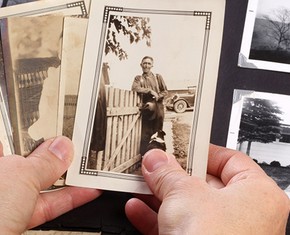The views expressed in our content reflect individual perspectives and do not represent the authoritative views of the Baha'i Faith.
We’ve all filled out those forms with checklists of personal descriptors: nationality, religion, sex, race, ethnicity. Sometimes we’re even asked to list memberships in organizations or political parties.
The assumption: that such categories actually portray who we are.
How much of this really describes us in any meaningful way? What if you were born into something – a place, a culture, a religion – but disavow it as part of your identity? Why do we keep putting ourselves into these boxes as if they give ourselves and others an idea of who we are?
The Baha’i teachings say the act of partitioning ourselves into rigid categories can create problems. Abdu’l-Baha, in a talk he gave in 1912, said: “By this division and separation into groups and branches of mankind, prejudice is engendered which becomes a fruitful source of war and strife.”
Abdu’l Baha also said this tendency is all but imaginary, as “… racial assumption and distinction are nothing but superstition.”
RELATED: 4 Practical Ways to Promote Race Unity
The Baha’i teachings ask humanity to unify, which means intentionally transcending our particular “groups and branches” to find the commonality all human beings share. Baha’u’llah, the prophet and founder of the Baha’i Faith, wrote:
O ye children of men! The fundamental purpose animating the Faith of God and His Religion is to safeguard the interests and promote the unity of the human race, and to foster the spirit of love and fellowship amongst men. Suffer it not to become a source of dissension and discord, of hate and enmity.
Yes, we each naturally form our sense of self and our worldviews by having been born into a cultural context with a particular perspective, filtered through the language we learn and the upbringing we receive. But to what extent can we say the people where we grew up are more similar to us than anyone else? How could this classification help us come to know our true spiritual selves?
If we actually knew all the ways others classify us, we might be astonished to know how we’re being perceived and stereotyped. Yet we still tend to classify ourselves, clinging to the place where our ancestors were born and calling it our “culture,” as though culture were some pristine thing, like a ceramic plate or a building. But culture, like language, changes and evolves along with human experience. Besides, human variety in any place is limitless. Further, our reality can’t be found in the world of matter. In a speech he gave in Paris, Abdu’l-Baha noted that, “The reality of man is his thought, not his material body.”
Lately we’ve all seen an increasing use of the term “identity,” having to do with how strongly someone identifies with the values of a group rather than how we see ourselves as unique individuals. Note the odd pairing of identity – which means distinctiveness or self, and identification – which means affinity or connection. If whatever group we identify with is being attacked, we also feel personally attacked and reinforce in our minds the boundary between “us” and “them.”
These kinds of mental constructs can engender prejudice. Insider-outsider group classifications arouse jealousy, hatred, antagonism and fear. When someone claiming a specific identity – national, political, religious, etc. – is attacked, the in-group membership grows stronger as members defend themselves. But clinging to identities can obstruct our understanding of each other, as Abdu’l-Baha explained:
Each nation has clung to its own imitations, and because these are at variance, warfare, bloodshed and destruction of the foundation of humanity have resulted … Man has laid the foundation of prejudice, hatred, and discord with his fellowman by considering nationalities separate in importance and races different in rights and privileges.
RELATED: How to Discover and Admit Our Own Prejudices
We mainly think of prejudice with regard to some of the obvious descriptions, like nationality, skin color and sex. But other more subtle types of prejudices exist – someone’s accent, clothing, appearance, even ideas. Abdu’l-Baha pointed out that:
… all religious, racial, patriotic and political prejudice must be abandoned, for these are the destroyers of the real foundation of humanity … the prejudices and bigotries which exist today among the religions are not justifiable, inasmuch as they are opposed to reality; Consider the prejudice of patriotism. This is one globe, one land, one country. God did not divide it into national boundaries. … He created all the continents without national divisions. Why should we make such division ourselves? These are but imaginary lines and boundaries.
Finding mutual interests and associations in and of itself isn’t a bad thing, but the practice needs to be understood in a proper perspective. In his Tablets of the Divine Plan, Abdu’l-Baha wrote:
In the contingent world there are many collective centers which are conducive to association and unity between the children of men. For example, patriotism is a collective center; nationalism is a collective center; identity of interests is a collective center; political alliance is a collective center; the union of ideals is a collective center, and the prosperity of the world of humanity is dependent upon the organization and promotion of the collective centers. Nevertheless, all the above institutions are in reality, the matter and not the substance, accidental and not eternal – temporary and not everlasting.
These words of Abdu’l-Baha suggest that we should learn to see each other as thinking, feeling spiritual beings, rather than judging one another by outward appearances. If we operate this way, we also might start to learn to understand each other as beings who strive to be more loving, kind, courteous, devoted, and friendly. In fact, since we know them so well, we may already regard close friends and family by these standards. To do otherwise is to hold others at arms’ length, distanced by an emotional or conceptual barrier, and overlook their true identity.
















Comments
Sign in or create an account
Continue with Googleor